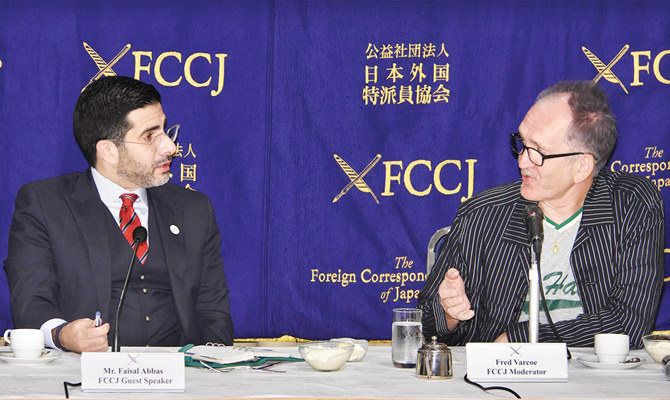TOKYO: Following the visit of Crown Prince Mohammed bin Salman to Japan for the G20 Summit, Arab News Editor-in-Chief Faisal J. Abbas provided context to growing Saudi-Japanese ties during a talk in Tokyo on Thursday.
Participating in a panel discussion at the Foreign Correspondents’ Club of Japan, moderated by British journalist Fred Varcoe, Abbas recalled an incident that marked a turning point in bilateral relations.
“It involved former Japanese Emperor Akihito and the late (Saudi) King Fahd. During the 1953 coronation of (Britain’s) Queen Elizabeth II, when King Fahd wasn’t even crown prince at the time let alone king, both he and the emperor had been invited to attend the ceremony,” said Abbas.
“Upon discovering that he’d been seated in the first row and the emperor had been seated in the third row, King Fahd immediately insisted on giving the emperor his own seat, despite the breach of British royal protocols,” Abbas added.
“A friendship grew out of mutual respect ever since that moment. In some circles, it’s a very famous story, and whenever there’s a state visit it’s always repeated. That shows you the level of respect between the leaderships of the two countries.”
Abbas took questions from journalists in attendance, and the topics included Saudi-Japanese ties, the Israeli-Palestinian conflict and Saudi-Iranian relations.
He also discussed educational reforms, being a journalist in Saudi Arabia, and ongoing efforts toward gender equality and female empowerment in the Kingdom.
Abbas expressed his happiness at being in Japan for a third time, saying he learned something new every time he was there, and hoped to spend more time in the country in the future.
He referenced the crown prince’s visit, saying he hoped to see Saudi-Japanese relations go beyond trade and extend to such areas as cultural exchange.
“The relationship started based on the fact that Japan doesn’t produce its own oil, and Saudi Arabia used to import a lot of automobiles from Japan,” Abbas said.
“But now, with the new crown prince and the focus on having a strong bilateral relationship with Japan, we’re looking to enhance the relationship.”
Abbas also discussed his interview with Japanese Foreign Minister Taro Kono, in which he discussed the possibility of Tokyo acting as a “credible broker” in ongoing efforts to resolve the Israeli-Palestinian conflict.
When asked about the Saudi position on Israel, Abbas stressed that the Kingdom has no issue with Judaism or Jews.
“We believe that the problem between Palestine and Israel is a land dispute, and taking it out of context has harmed both sides,” he said, adding that once religion enters the argument, it becomes more complicated.
“You stop talking about land, and it becomes a nasty who’s right, who’s wrong situation. Our position is clearly outlined in the Arab Peace Initiative (API) of 2002.”
The API calls for normalizing relations between Arab states and Israel in exchange for the latter’s full withdrawal from the occupied territories, including East Jerusalem, and a “just settlement” of the Palestinian refugee issue based on UN Resolution 194.
Abbas welcomed the idea of Japan becoming an unbiased broker in negotiations. “I think it’s a great idea. The region has a lot of trust in Japan, and I hope it succeeds,” he said.
On the subject of Tehran, he said Saudi Arabia has “more in common with Iran than probably any other country in the world. It was never a position of us or them. What we’re asking for is to stop the destabilizing activities Iran has been carrying out in the region.”
Abbas added: “If we can disarm Iran, I think it would achieve the purpose without a drop of blood, and it would be an excellent achievement.”
He also discussed his attempts to create a gender-inclusive environment at Arab News, referencing his plan for a 50/50 gender ratio by 2020.




























